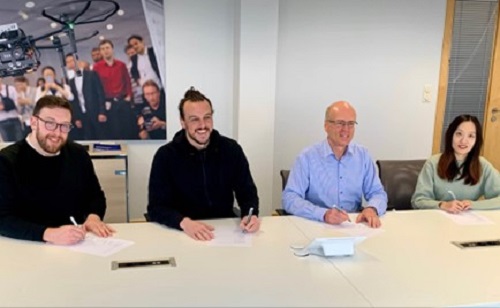 (L-R) Dr Christopher Morse (Zortify); Prof. Dr Florian Feltes (Zortify); Prof. Dr Björn Ottersten (SnT); Dr Siwen Guo (Zortify);
Credit: © University of Luxembourg / Zortify
(L-R) Dr Christopher Morse (Zortify); Prof. Dr Florian Feltes (Zortify); Prof. Dr Björn Ottersten (SnT); Dr Siwen Guo (Zortify);
Credit: © University of Luxembourg / Zortify
Luxembourg-based human resources (HR) technology company Zortify and the Interdisciplinary Centre for Security, Reliability and Trust (SnT) of the University of Luxembourg recently announced a new partnership aimed at pioneering the ethical use of artificial intelligence (AI) and trust in a European HR context.
This collaborative project defines three key pillars: machine learning, explainability and interaction design. The former will see the team train new language models built on ethically sourced datasets to better understand European languages, especially low-resource languages like Luxembourgish. The second pillar aims to make algorithms more transparent by developing alternative methods to understand how highly complex language models make decisions. The third pillar aims to understand the needs of non-expert users to develop interactive front-end experiences to enable them to use the technologies and gain insights without any prior expertise.
Chronicle.lu reached out to Prof. Dr Florian Feltes, co-founder of Zortify, and Dr Siwen Guo, co-director of Zortify Labs, to learn more about this partnership and about the company's AI-based decision-making solutions in general. Dr Guo and fellow Zortify Labs co-director Dr Christopher Morse are currently leading the new R&D project with SnT.
Prof. Dr Florian Feltes and Dr Marcus Heidbrink founded Zortify in September 2018, with the goal of using technology such as natural language processing (NLP) to "better understand people" (for example in hiring processes) and helping companies of all sizes "make use of human potential in a better way", i.e. in a "scaleable, more efficient, less biased way." They chose Luxembourg because of its "easy access to international talents" and multilingualism, noted Prof. Dr Feltes. In addition, Luxembourg's "growing" startup ecosystem means there is quite a lot of support available.
Elaborating on the technology used, Dr Siwen Guo described NLP as "at the centre" of Zortify's services. She explained that the team includes experts in various fields who work together to "make the technology more accessible and usable for different people". The goal of Zortify Labs is to look not just at the practical application side but also to focus on research aimed at improving this innovative technology. With NLP, the team can analyse information taken from text generated by "real people" who have been asked to answer questions using their own words and opinions. Psychologists in the labs then help to "insert this expert knowledge into technology [...] and combine the technology together with the expertise from different disciplines and then they can build algorithms that are more useable and can understand human language better for the use cases."
Concerning the ethical use of AI, Prof. Dr Florian Feltes stressed the importance of looking at what data is used to train large language models. At Zortify, the data used for its algorithms is "acquired or conducted for specific cases". Different disciplines work with the data to "build algorithms that are less biased and more objective than what we as humans can do". He added that it is important to collect data that is "very diverse, very representative", for example regarding gender, and thus to "use the right data to train our algorithms". He also stressed that Zortify's tool does not take the decision for users: "We deliver you insights, [such as] the organisational culture or the team constellation […], but you take later on the decisions."
Regarding the upcoming EU AI Act, Prof. Dr Feltes noted that there had been a lot of debate about this in Europe. Within Zortify, three out of 35 team members are working specifically on explainable AI and even if there was no EU AI Act, the team would have aimed to make the process (and results) "more transparent".
Dr Siwen Guo elaborated that the new ethical AI research project with SnT defines two parts: the NLP technical side and the explainability and useability of algorithms. Regarding the former, she stressed the importance of developing multilingual language models that "perform fairly across different [European] languages despite the size of the languages". The second part focuses on making algorithms more explainable, not only to experts but also to non-experts, using different methods (for example through visualisation, seeing how an algorithm gets to its results). Dr Guo emphasised that this technology "should be beneficial for everyone".
There are currently four PhD students as part of this partnership who are focusing on "mak[ing] this knowledge comprehensible for different audiences". Three of the students are working internally and supervised at Zortify (plus they receive supervision from professors at the university) and one PhD candidate is based at the university. Prof. Dr Florian Feltes described this as "quite interesting" also for the Luxembourgish market "because it's a chance to keep these people, talents in the country and really educate them and increase the expertise in this field within the ecosystem."
Zortify will also host a summer school at the end of August 2023, bringing together in Luxembourg about 35 people from around the world to collaborate with Zortify and experts from different universities and industries for one week. The topics of explainable AI, usability and the increase of human experience in companies are on the agenda. As Prof. Dr Feltes noted, academia and industry tend to work separately but what Zortify appreciates about SnT is the possibility of "working together on industrial solutions with academic approaches and frameworks".








